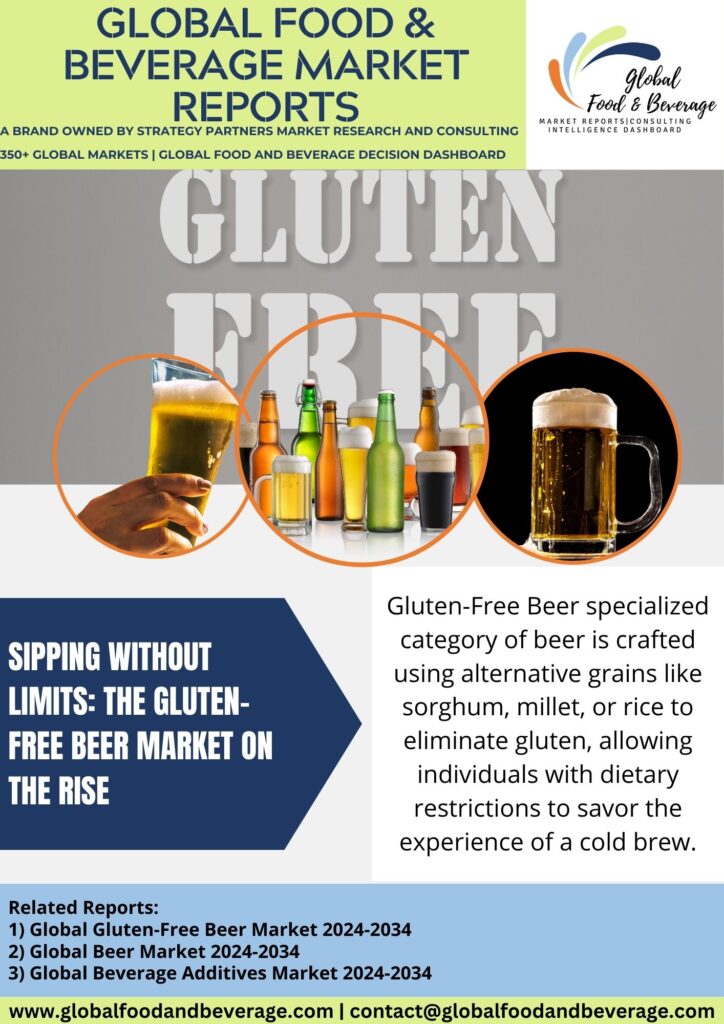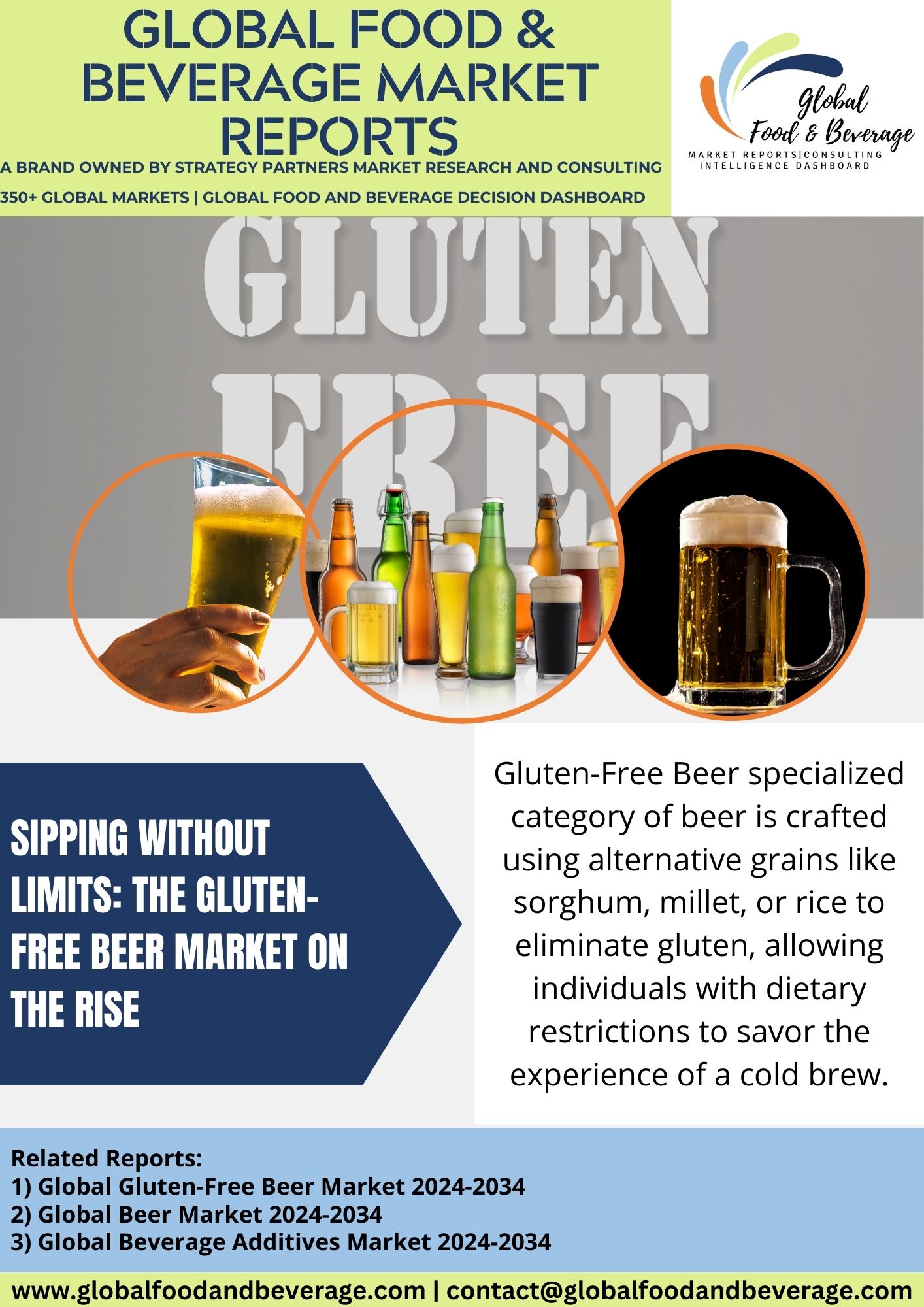Sipping Without Limits: The Gluten-Free Beer Market on the Rise

Gluten free beer has emerged as a welcome innovation for individuals with celiac disease or gluten sensitivity who seek to enjoy a refreshing beer without compromising their health. Traditional beer is brewed using barley, wheat, and rye, all of which contain gluten. For those with gluten-related disorders, consuming such beers can lead to adverse reactions and long-term health consequences. Gluten-free beer addresses this challenge by utilizing alternative grains and ingredients that do not contain gluten.
Sorghum, millet, rice, and corn are among the grains commonly used as substitutes in gluten-free beer production. These grains not only contribute to the beer’s fermentable sugars but also impart distinct flavors, textures, and aromas, creating a diverse range of gluten-free beer styles. Brewers have embraced the challenge of crafting high-quality gluten-free beers that rival their traditional counterparts in taste and appeal.
One of the key considerations in gluten-free beer production is the use of gluten-free malt or malt alternatives. Malt provides the sugars necessary for fermentation and influences the beer’s color and flavor. Brewers may opt for malted gluten-free grains, such as millet or buckwheat, or explore non-grain alternatives like quinoa or chestnuts to achieve the desired brewing characteristics.
Gluten free beer has witnessed increased popularity not only among individuals with gluten-related disorders but also within the broader consumer market. As awareness of gluten sensitivity grows and dietary preferences evolve, the demand for gluten-free products, including beer, has risen. This surge in demand has prompted breweries worldwide to diversify their offerings and develop gluten-free beer options, expanding choices for consumers in bars, restaurants, and supermarkets.
The gluten-free beer market has evolved beyond mere necessity to embrace innovation and quality. Craft breweries, in particular, have played a crucial role in elevating the standards of gluten-free beer, experimenting with various ingredients and brewing techniques to deliver a spectrum of flavors, from hoppy pale ales to rich stouts. These efforts have not only catered to the gluten-free community but have also contributed to changing perceptions about the potential and versatility of gluten-free beers.
ADVANCEMENTS
Ggluten-free beer production have marked a significant shift in the brewing industry, responding to the demand from individuals with celiac disease and gluten sensitivity. One notable breakthrough is the development of alternative grains and starches that serve as gluten-free substitutes for traditional barley malt. Brewers are experimenting with ingredients such as sorghum, millet, rice, buckwheat, and quinoa to create gluten-free beers with distinct flavors and profiles.
Advancements in enzyme technology have played a crucial role in gluten-free brewing. Enzymes capable of breaking down gluten proteins during the brewing process contribute to the production of beers that meet gluten-free standards. These enzymes help ensure that the final product contains gluten levels below the threshold considered safe for individuals with gluten-related disorders.
Innovations in brewing techniques have improved the sensory attributes of gluten-free beers. Brewers are refining processes such as mashing, fermentation, and filtration to enhance the mouthfeel, aroma, and overall quality of gluten-free beer. This attention to detail contributes to a more enjoyable and diverse range of options for consumers who follow gluten-free diets.
The emergence of gluten-free craft breweries and dedicated gluten-free brewing facilities signifies a growing market for these products. These establishments focus solely on producing gluten-free beers, allowing for specialization and innovation in the sector. The craft beer movement, which traditionally centered around barley-based beers, has expanded to include a variety of gluten-free options.
Additionally, advancements in gluten testing methods and certification standards help ensure the safety and transparency of gluten-free beer products. Rigorous testing protocols and gluten-free certifications provide consumers with confidence in the authenticity and compliance of gluten-free beers.
CHALLENGES
The production and consumption of gluten-free beer face several challenges, ranging from ingredient selection to brewing processes, consumer perception, regulatory compliance, and market competition. One significant challenge is the formulation of gluten-free beers that replicate the taste and mouthfeel of traditional barley-based beers. Traditional brewing relies on barley, which contains gluten, to contribute to the characteristic flavors and textures of beer. Developing alternative grains or ingredients that can mimic these qualities while remaining gluten-free poses a considerable challenge for brewers.
Ingredient availability and cost are additional challenges for gluten-free beer production. Alternative grains like sorghum, rice, or millet may have different flavor profiles and can be more expensive than barley. Sourcing high-quality gluten-free grains in sufficient quantities to meet demand while maintaining cost-effectiveness presents logistical challenges for brewers.
Cross-contamination and maintaining gluten-free integrity during brewing are ongoing challenges. Brewers must implement rigorous cleaning procedures and dedicate equipment to gluten-free production to prevent contamination from gluten-containing grains. Strict adherence to gluten-free brewing practices is essential to ensure the safety of individuals with gluten sensitivity or celiac disease.
Consumer perception and acceptance of gluten-free beer represent challenges. While the market for gluten-free products has expanded, some consumers may still associate gluten-free beers with inferior taste or quality. Education about gluten-related disorders and effective marketing strategies are essential for changing perceptions and promoting the benefits of gluten-free beer.
Regulatory compliance is a complex challenge in the gluten-free beer industry. Meeting labeling requirements, adhering to gluten-free certification standards, and navigating diverse regulations across regions or countries demand continuous diligence to ensure transparency and compliance.
Market competition is intense, with an increasing number of breweries entering the gluten-free beer space. Successfully differentiating products, addressing diverse taste preferences, and meeting consumer expectations for quality and variety are essential for success in a competitive market.
CONCLUSION
Gluten-free beer has transcended its initial niche market, becoming a symbol of inclusivity and innovation in the brewing industry. As gluten sensitivities gain awareness, the demand for flavorful, gluten-free alternatives rises. Breweries worldwide have risen to the challenge, producing a diverse array of high-quality gluten-free beers that rival their traditional counterparts. This evolution reflects not only a commitment to dietary inclusivity but also the creative prowess of brewers. The future of gluten-free beer holds promise for continued refinement, expanding options, and a flavorful journey where those with gluten restrictions can savor the nuanced tastes of a well-crafted, gluten-free brew.
